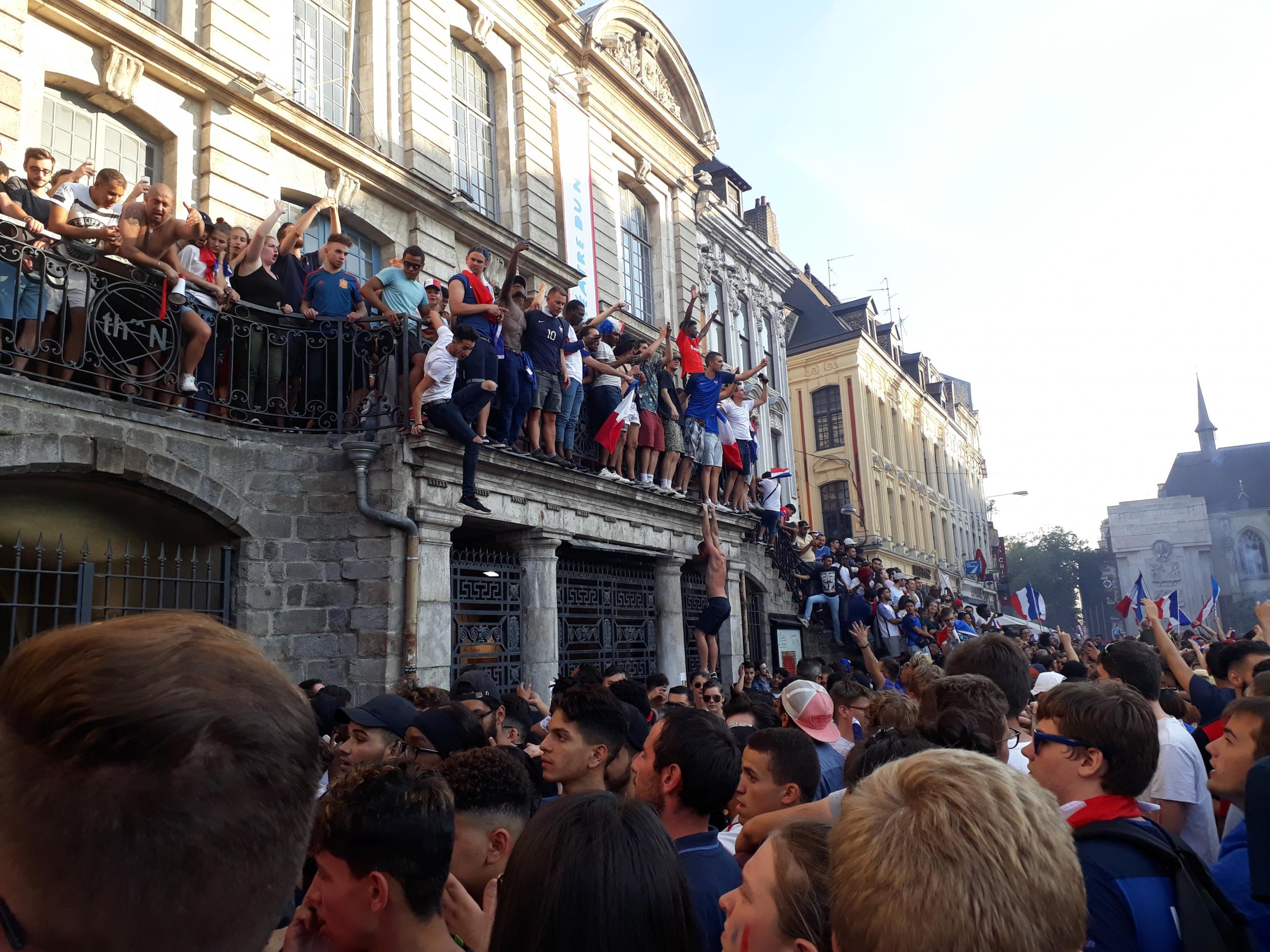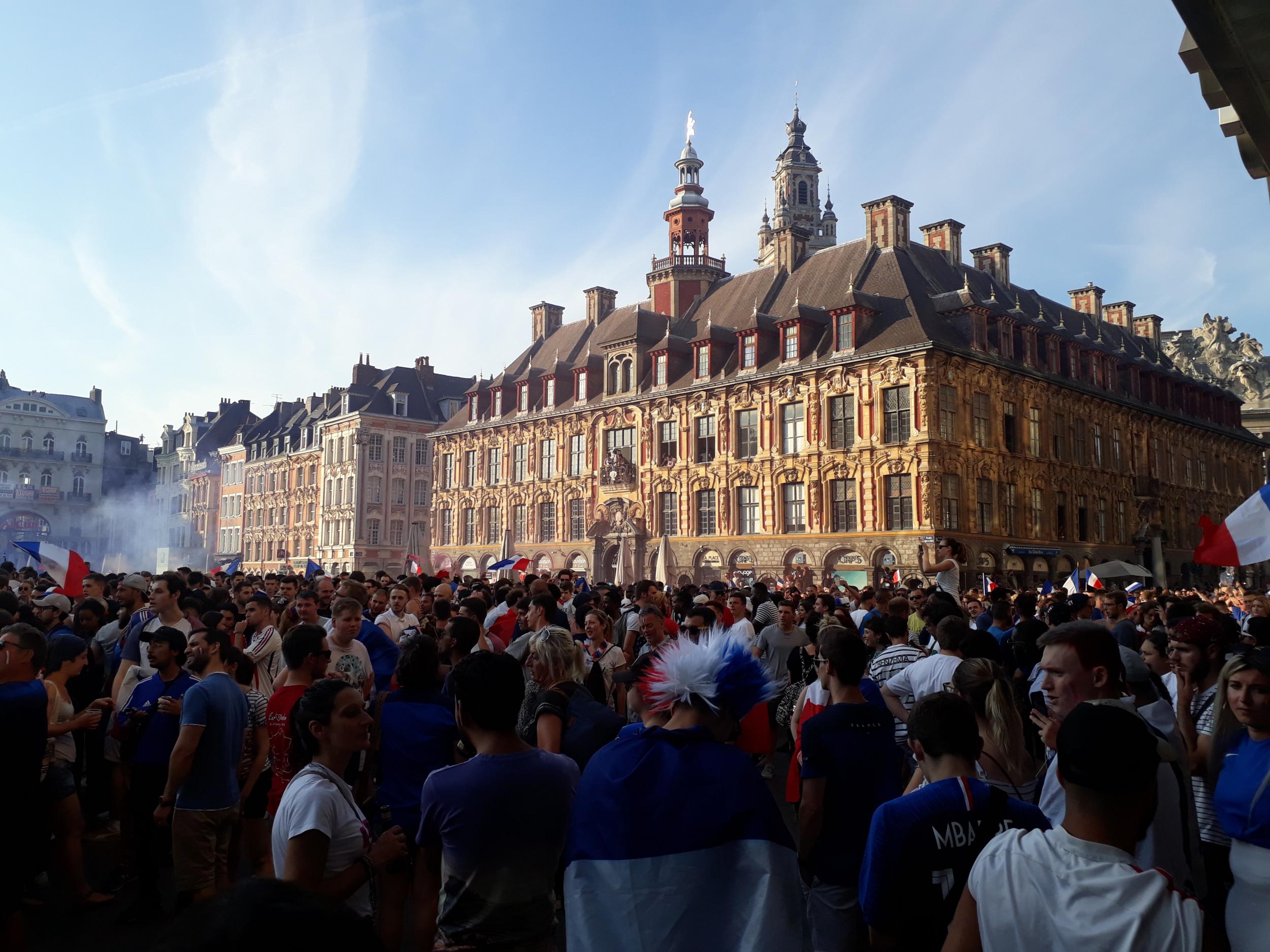On the streets of France, a flag-waving joy evaporates into trying to work out what World Cup glory actually means
In Lille, James Eastham wanders through the crowds and wonders what longer-term effect this might have on France and whether Emmanuel Macron can harness this positive energy

Your support helps us to tell the story
From reproductive rights to climate change to Big Tech, The Independent is on the ground when the story is developing. Whether it's investigating the financials of Elon Musk's pro-Trump PAC or producing our latest documentary, 'The A Word', which shines a light on the American women fighting for reproductive rights, we know how important it is to parse out the facts from the messaging.
At such a critical moment in US history, we need reporters on the ground. Your donation allows us to keep sending journalists to speak to both sides of the story.
The Independent is trusted by Americans across the entire political spectrum. And unlike many other quality news outlets, we choose not to lock Americans out of our reporting and analysis with paywalls. We believe quality journalism should be available to everyone, paid for by those who can afford it.
Your support makes all the difference.If you didn’t know Parkour was a French thing, you would have got a pretty good idea from the way groups of jubilant fans clambered on to the balcony of the Theatre Nord overlooking the Grand’Place in Lille about an hour after Les Bleus had been crowned world champions yesterday.
As thousands of locals streamed into the city centre from all directions to celebrate France’s 4-2 win over Croatia , the fittest and strongest were determined to secure some of the best vantage points. The wide stone steps leading up to the theatre balcony that offers views over the central meeting point couldn’t be accessed as they were already packed with people – so daredevils decided to shin up walls and vault railings instead in order to be in prime position as the party got started.
Over the next four hours, Lille partied hard. Klaxons sounded, firecrackers let rip, renditions of “I Will Survive” – the Gloria Gaynor hit that became the unlikely anthem for the France side that won the World Cup in 1998 – broke out on Rue Faidherbe. As the minutes passed more and more cars drove from the suburbs into the city centre, with fans hanging out of the windows and, in a couple of cases, sitting on the bonnet or lying on the roof.

The streets had been decked out with Tricolores for Bastille Day celebrations the day before. On this special weekend, they served a double purpose. A shortage of official flags wouldn’t have posed a problem, anyway: fans brought their own, thousands of them, some bigger than the children waving them. Men and women wore red, white and blue wigs, while others tied “Allez les Bleus!” scarves around their necks despite the 30C heat baking the city.
In 1998 – “when a baguette cost four francs,” as one newspaper put it – there were fewer France shirts, but wearing replica outfits has become something of a craze on such occasions in the intervening years. The most popular name on the back was Griezmann, followed by Mbappe and Pogba. In the vintage shirts category Zidane was the comfortable winner, followed by Henry, Benzema (remember him?) and Ribery.
Unlike in some other cities, there was no big screen in the main square in Lille. Instead, the main public viewing point was at Gare Saint Sauveur, a former railway station converted into an exhibition hall a 15-minute stroll away. Free tickets had also been on offer at the nearby Zenith concert venue. All 5,000 had been snapped up.
Newspapers on the morning of the game talked about what a victory would mean for Les Bleus and the nation in general. A survey in Le Journal du Dimanche showed that 84 per cent of people thought the team would win, but only 51 per cent said France’s run to the final had had a positive impact on their morale. In the same publication, 31 per cent of those asked said a France win would lead to domestic economic growth, but 25 per cent said it would lead to an increase in chauvinism and nationalism and 44 per cent said nothing in particular would change.
The shadow of 1998 loomed large, as it has on every big occasion for the national team over the past two decades. World Cup winner Youri Djorkaeff was one of the experts in the studio for main broadcaster TF1, while former team-mate David Trezeguet spoke pitchside and World Cup-winning left-back Bixente Lizarazu was co-commentator on the game.

The most obvious link to France’s glorious past, though, was in the dressing-room. “A sort of anti-hero in the star-system era,” is how newspaper Le Figaro described Didier Deschamps. “He’s modest, laconic, a hard worker and organised. He’s picked players because of their sporting qualities and their attitude – in other words, the best. What distinguishes the team is not what makes the players different but what draws them together: France.”
France knows better than to read too deeply into events on the pitch, however. The 1998 generation nicknamed Black, Blanc, Beur (the black-white-Arab generation) had all sorts of meaning grafted on to it, only for certain sectors of the chatterati that play such a prominent role in French public life to belatedly accept that sport cannot solve as many of society’s problems as we might like it to. As Jacques Chirac was 20 years ago, President Emmanuel Macron – filmed leading celebratory chants in the France dressing-room having vigorously embraced each and every player at the post-match medal ceremony – seems determined to bask in the glow of the team’s success. Whether his personal approval ratings will be boosted remains to be seen.
The players are due to meet Macron in the more formal surroundings of the Élysée Palace on Monday evening. By then, they’ll have completed an open top bus tour in front of several hundred thousand fans on the Champs-Élysées.
Shortly before midnight last night, the crowds had thinned out in Lille, but hardcore fans continued to sing, shout and embrace each other in the main fountain. Families headed home, sleeping children wrapped in flags on their shoulders.
Sports daily L’Equipe has printed four times its usual number of copies today. Attendance at work will be lower than usual this morning. France has a second star on its shirt but the country is only just starting to process what this World Cup win means.
Join our commenting forum
Join thought-provoking conversations, follow other Independent readers and see their replies
Comments